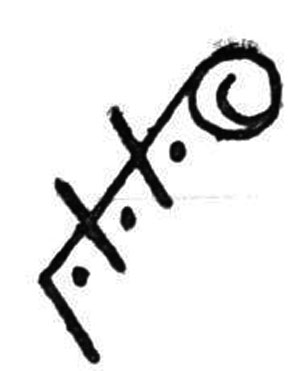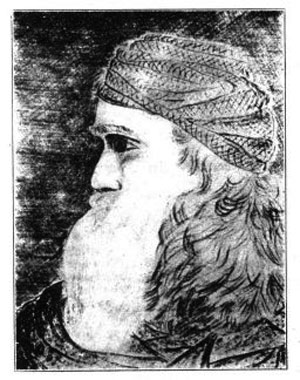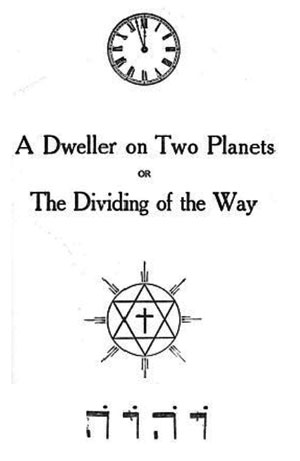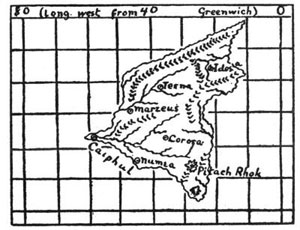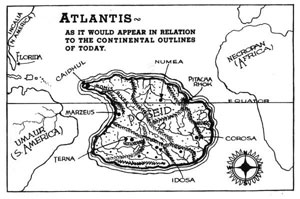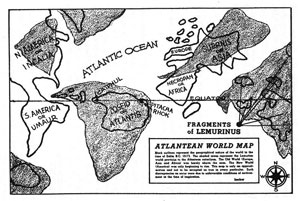 by admin » Tue Apr 09, 2019 10:44 pm
by admin » Tue Apr 09, 2019 10:44 pm
BOOK THE FIRST.
CHAPTER I. ATLANTIS, QUEEN OF THE WAVE.
"Why not?" I asked myself, pausing amidst the snow on the mountain, there so far above the sea that the Storm King was ever supreme, even while summer reigned below. "Am I not an Atlan, a Poseid, and is not that name synonymous with freedom, honor, power? Is not this, my native land, the most glorious beneath the sun? Beneath Incal?" Again I queried:--"Why not, aye, why not strive to become one amongst the foremost in my proud country?"
"Poseid is the Queen of the Sea, yea, and of the world also, since all nations pay tribute of praise and commerce to us--all emulate us. To rule in Poseid, then, is not that virtually to rule over all the earth? Therefore will I strive to grasp thc prize, and I will do it, too! And thou, O pale, cold moon, bear witness of my resolve"--I cried aloud, raising my hands to heaven--"And ye also, ye glittering diamonds of the sky."
If resolute effort could insure success, I usually achieved whatever end I determined to attain. So there I made my vows at a great height above the ocean, and above the plain which stretched away westward two thousand miles to Caiphul, the Royal City. So high was it, that all about and below me lay peaks and mountain ranges, vast in themselves, but dwarfed beside the apex whereon I stood.
All around me lay the eternal snows; but what cared I? So filled with the new resolve was my mind--the resolve to become a power in the land of my nativity--that I heeded not the cold. Indeed, I scarce knew that the air about me was cold, was chill as that of the Arctic fields of the remote north.
Many obstacles would have to be surmounted in the accomplishment of this design--for truly, what was I at that moment? Only a mountaineer's son, poor, fatherless; but, the Fates be praised! not motherless! At thought of her, my mother, miles away, down where the perennial forests waved, where snow seldom fell; while I stood on the storm-kissed summit, alone with the night and my thoughts--at the thought of my mother my eyes grew moist, for I was only a boy, and often a sad enough one, when the hardships which she endured arose to mind. Such reflections were but added incentives to my ambition to do and to be.
Once more my thoughts dwelt on the difficulties I must encounter in my struggle for success, fame and power.
Atlantis, or Poseid, was an empire whose subjects enjoyed the freedom allowed by the most limited monarchical rule, The general law of official succession presented to every male subject a chance for preferment to office. Even the emperor held an elective position, as also did his ministers, the Council of Ninety, or Princes of the Realm--offices analagous to those of the Secretarial Portfolios of the American Republic--its veritable successor. If death claimed the occupant of the throne, or any of the councillors, the elective franchise came into activity, but not otherwise, barring dismissal for rnalfeasance in office, a penalty which, if incurred by him, not even the emperor was exempt from suffering.
The possession of the elective power was vested in the two great social divisions, which embraced all classes of people, of either sex. The great underlying principle of the Poseid political fabric might be said to have been "an educational measuring-rod for every ballot-holder, but the sex of the holder, no one's business."
The two major social branches were known by the distinctive names of "Incala" and "Xioqua," or, respectively, the priesthood and scientists.
Do my readers ask where that open opportunity for every subject could be in a system which excluded the artisans, tradespeople, and military, if they happened not to be of the enfranchised classes? Every person had the option of entering either the College of Sciences, or that of Incal, or both. Nor was race, color or sex considered, the only prerequisite being that the candidate for admission must be sixteen years of age, and the possessor of a good education obtained in the common schools, or at some of the lesser seats of collegiate learning, as the Xioquithlon in the capital city of some one of the Poseid States, as at Numea, Terna, Idosa, Corosa, or even at Marzeus' lower college, Marzeus being the principal art-manufacturing center of Atl. Seven years was the allotted term of study at the Great Xioquithlon, ten months in each year, divided into two sub-terms of five months each, devoted to active work, and one month allowed for recreation, half of it between each session. Any student might compete in the annual examination exercises, held at the end of the year or just preceding the vernal equinox. That we recognized the natural law of mental limitation will be obvious from the fact that the course of study was purely optional, the aspirant being at liberty to select as many, or as few topics as were agreeable, with this necessary proviso:--that only possessors of diplomas of the first class could be candidates for even the humblest official position. These certificates were evidence of a grade of acquirement which embraced a range of topical knowledge too great to be mentioned, otherwise than inferentially, as the reader proceeds. The second-grade diploma did mot confer political prestige, except in the matter of carrying with it the voting privilege, although if a person neither cared to be an office holder, nor to vote, the right to instruction in any educational branch was none the less a gratuitous privilege. Those, however, who only aspired to a limited education, with the purpose of more successfully pursuing a given business, as tuition in mineralogy by an intending miner, agriculture by a farmer, or botany by an ambitious gardener--had no voice in the government. While the number of those unambitious ones was not small, none the less the stimulus of obtaining political prestige was so great that not above one in a dozen of the adult population was without at least a secondary diploma, while fully one-third had first-grade certificates. It was owing to this, that the electors found no scarcity of material for filling all elective positions under the government.
Some uncertainty is possibly left in the mind of the reader as to what constituted the difference between priestly and scientific suffragists. The only essential difference was that the curriculum at the Incalithlon, or College of Priests, embraced, in addition to every high-grade feature taught at the Xioquithlon, also the study of a wide range of occult phenomena, anthropological and sociological themes, to the end that graduates in the sciences might have the opportunity of fitting themselves to minister to any want, which men of less erudition and less comprehension of the great underlying laws of life might experience, in any phase or condition. The Incalithlon was in fact the very highest, most complete institution of learning which the world knew then, or--pardon what may seem to be, but is not, Atlan conceit--has known since; and for that matter, will know for centuries to come. As such an exalted educational institution, students within its halls must needs possess extra zeal and determined willpower in order to pursue, and secure graduation certificates from its board of examiners. Few indeed had found life extended enough to enable them to acquire such a diploma; possibly not one in five hundred of those who made honorable exit from the Xioquithlon--itself an institution not second to the modern Cornell University.
As I pondered, there amidst those mountain snows, I decided not to attempt too much, but a Xioqua I determined to be, if any possible chance existed; although I scarcely hoped for the possession of the eminence conferred by the title of Incala, I vowed that I would make an opportunity to compete for the other, if no occasion presented otherwise. To obtain the proud distinction would require, in addition to arduous study, the possession of ample pecuniary means to furnish the expense of living, and the maintenance, at its highest, of an unfaltering energy of purpose. Whence could I hope to obtain all this? The gods were believed to help the needy. If I, a lad of not yet seventeen summers, who had a mother looking to me for support and the necessaries of life, with nothing that could aid me to attain my aspirations except native energy and will, might not be placed in that category, then who were the needy? Methinks there should be no more evidence of dependence necessary, and it were indeed proper in the gods to extend aid.
Filled with such reflections as these, I climbed yet higher towards the top of the sky-piercing peak, near the apex of which I stood, for the dawn was not far distant, and I must be. on the highest stone to greet Incal (the sun) when He conquered Navaz, else He--chief of all the manifest signs of the great and only true God, whose name He bore, whose shield He was--might not favorably regard my prayer. No, He must see that the supplicating youth spared no pains to do Him honor, because it was for this purpose only that I had climbed alone, amidst these solitudes, up that trackless steep of snow, beneath the starry dome of the skies.
"Is there," I asked myself, "a more glorious belief than this which my country-folk hold? Are not all Poseidi worshipers of the Great God--the one true Deity--who is typified by the blazing sun? There can be nothing more sacred and holy." So spake the boy whose maturing mind had grasped the really inspiring exoteric religion, but who knew of none other, deeper and more sublime, nor was he to learn of it in the days of Atla.
As the first glance of light from behind His shield stole through the dark abyss of night, I threw myself prone in the summit snows, where I must remain until the God of Light was entirely victorious over Navaz. Triumphant at last I Then I arose, and making a final profound obeisance, retraced my steps down that fearful declivity of ice, and snow, and barren rock, the latter black and cruelly sharp, thrusting its ridges through the icy coat, showing the ribs of the mountain which stood, one of the peerless peaks of the globe, thirteen thousand feet above the level of the sea.
For two days all my efforts had been to reach that frigid summit and cast myself, a living offering, on its lofty altar, thus to honor my God. I wondered if He had heard and noted me. If He had, did He care? Did He care enough to direct His vice-regent, God of the mountain, to aid me? To the latter, without knowing why, I looked, hoping in what may seem a blind fatuity, for him to reveal a treasure of some sort, or--
What is that dull metallic glint in the rock whose heart my. iron-shod alpenstock had lain bare to the rays of the morning sun? Gold! O Incal! It is so! Yellow, precious gold!
"O Incal," I cried, repeating His name, "be thou praised for returning answer so quickly to Thy humble petitioner!"
Down in the snow I knelt, uncovering my head out of gratitude to the God of All Being, the Most High, whose shield, the sun poured forth his glorious rays. Then I looked again on the treasure. Ah, what a store of wealth was there!
As the quartz rock splintered beneath my excited strokes, the precious metal held it together, so thickly did it vein its matrix. Sharp edges of the flinty stone cut my hands, so that the blood flowed from half a dozen places, and as I grasped the icy quartz which did the deed, my bleeding hands froze fast upon it-a union of blood and treasure! No matter! and I tore them loose, unheeding the pain, so much was I excited.
"O Incal," I exclaimed, "Thou are good to Thy child in so liberally bestowing the treasure which shall enable a realization of his resolution, ere the heart hath opportunity to grow faint through long-deferred hope."
I loaded into my capacious pockets all that I could stagger under, selecting the richest and most valuable pieces of the gold quartz. How should I mark the spot, how find it again? To a born mountaineer this was no hard task, and was soon accomplished. Then onward, downward, homeward, joyfully I swung, with light heart, if heavy load. Over these mountains, indeed not two miles from the base of my treasure peak, wound the emperor's highway to the great ocean, hundreds, of miles away on the other side of the Caiphalian plains. This causeway once reached, the most fatiguing part of the trip would be over, although but one-fifth of the entire route would yet have been traversed.
To give some idea of the difficulties encountered in scaling or descending this giant mountain, I must remark that the final five-thousand feet of the ascent could be made by only one tortuous route. A narrow gorge, a mere volcanic fissure, afforded foothold of the most precarious character, all other parts of the peak being insurmountable cliffs. This meager support existed for the first one thousand feet. Above this point the cleft ceased. Near its upper end a small cave existed, rather higher than a man's stature, and capable of holding perhaps twenty people. In the farther end of this rocky room was a hole--a crack wider horizontally than in the perpendicular. Entering this crevice by crawling, serpent-fashion, the venturesome explorer would find that for several hundred paces he must needs descend a rather sharp incline, albeit the crevice in the first dozen steps so widened, or heightened, that a more or less upright posture could be assumed. From the end of its descending course it twisted and again increased in size so as to form a tunnel, ascending by tortuous windings, its walls affording sufficient support to make the climbing safe, although pursued upward at an angle of about forty degrees, while in some parts an even greater degree of perpendicularity marked the passage. In this way an upward climb of thirty odd hundreds of feet was accomplished, the sinuosities of the route greatly increasing the distance covered in a vertical rise. This, reader, was the sole method of reaching the summit of the highest mountain of Poseid, or Atlantis, as thou callest the island-continent.
Arduous as was its passage, there was more than enough room in this dry old chimney, or water-course, whichever it was, Chimney it certainly had been, originally, though now water-worn to such an extent as to render the idea of its igneous formation, de novo, merely conjectural. At one part of its course this long hole widened into a vast cavern. This led away at right angles from the chimney, and down, down, until far in the bowels of the mountain--thousands of feet it seemed in the dread darkness--he who ventured so far found himself on the brink of a vast abyss, which had no visible side except that on which he stood; beyond this, further progress was impossible except for winged things, as bats, and bats were there none in that awful depth.
No sound came back from its frightful chasm, no brightness of torches had ever revealed its other shore--nought was there but a sea of eternal inky blackness. Yet here were no terrors for me; rather a fascination. While others may have known of the place, I had never found a companion with enough temerity to brave the unknown, and stand by my side on the horrid brink, where I had stood, not once only but several times in days gone by. Three times I had been there, impelled by curiosity. On the third occasion I had leaned over the edge to seek a possible further descent, when the stone upon which I was--a huge basaltic block--loosened from its place, fell, and I barely escaped with my life. I fell, and for several minutes sounds of its descent came echoing back to where I stood; my torch went with it, and far adown the depths its sparks gleamed like fire-flies as it struck projecting points of the rock, ere it finally disappeared. I was left in that deep darkness, weak from my great peril, to make my way up and out-if I could. If not, then to fail and die. But I succeeded. Thenceforth I had no curiosity to explore that unknown gulf. Through the chimney which led past the upper end of this abyssmal cavern--between the upper end of the outer fissure in the cliff and the summit's side, five, or six hundred feet below the apex of the mountain--I had been many times; often had I been over the spot where a chance blow of my staff revealed the golden treasure, yet never found the precious store until I had asked Incal for it, urged by the pressing burden of my necessities. Is it strange that I felt absolute faith in the religious belief of my people?
It was into the dark chimney that I had to go when I left the snowy summit--out of the sunlight and fresh air, into dense blackness, and a slightly sulphurous atmosphere, but if I left the morning brightness, I also left the fearful cold of the external air, for inside the tunnel, if dark, it was warm.
At last, I came into the small room at the head of the thousand-foot crevice which would take me to the easier slopes of the lower and middle third of the mountain. In that room I paused. Should I return for another load of auriferous rock? Or should I go directly on my homeward way? At length I turned and retraced my steps. With the noon hour I stood once more beside my treasure spot. Then down again with my second load, till the weary toil ceased almost--for I was standing then at the entrance to the great cavern, four hundred feet from the little room at the head of the outer crevice--four hundred feet of pretty steep climbing. After a moment's pause I resumed the short but sharp ascent, and was soon in the little room, with only a dozen feet at most between myself and the free air. Sinuous, the long tunnel was, considered as a whole, yet it had some passages as straight, as if cut by tools along a line. The four hundred feet, more or less, which separated the room where I stayed my steps, from the entrance proper of the cavern, was such a straight stretch, and perhaps on that account as difficult to traverse as any part of the whole tunnel. Indeed it would have been impossible, except for its rough sides affording some slight foothold. Had the place been light, instead of filled with the blackness of darkness, I could have seen directly into the cavern from the apartment in which I was resting. The warm air induced me to sit or rather lie down at this point, even though I could not see, and so, as I rested there, I ate a handful of dates and sipped a little of the melted snow-water which my water-skin contained. Then I stretched myself out to sleep in the warm air.
flow long I slept I did not know, but the awakening--ah! the terror of it! Blasts of air so hot as to almost scorch, swept over and past me, laden with stifling fumes, and sending back a hoarse murmur as they rushed up the passage to the summit. Howling, groaning noises came up on the fervid breath from the abyss, mingled with the sound of tremendous explosions and deafening reports. Above all other causes for terror was a glow of red light reflected from the walk of the cavern, into which I found I could look with unobstructed freedom, and through whose depths shone flashes of red and green and blue, and every other color and tint, gases on fire, For a time, fright held me fast, so that without power to move I remained gazing into the awful hell of the blazing elements, I knew that the light and heat, both momentarily increasing, and the stifling vapors, the noise and the quivering of the mountain, all pointed but one and the same meaning--active volcanic eruption. At last, the spell which numbed my senses was broken by my catching sight of a spurt of molten lava which dashed up the intervening passage, projected a number of feet therein by an explosion within the cavern behind, Then I rose up and fled--fled across the floor of the little room and crawled with insane energy of haste through the horizontal entrance, which seemed never so low as that moment! I had forgotten that I carried gold in my pockets, and the fact only came back when I felt the retarding weight of the precious rock. But with the exertion to escape came a certain degree of calmness, and the restored presence of mind bade me not throw away the treasure. Reflection convinced me that the danger, although impending, was probably not immediate. So that I again crawled back into the little room and taking a sack which I had left there, filled it with all the ore I could carry. I undid a leather thong from my waist--a cord forty feet long--and looping one end to a point of rock, at the upper end of the crevice, I lowered the sack to the other extremity of the small cord, and then climbed down after it. Shaking the loop from the rock above, I repeated the performance again and again as I descended. In this way I reached the bottom of the crevice with the larger portion of my two loads of ore. From this point onwards my route my along the crest of a rocky ridge, not very wide, but sufficiently so to form an easy path.
I had just started along this ridge when I looked back over the way I had come. At that instant, a shock of earthquake occurred that almost sufficed to throw me to the ground, and out of the little cave, where I had slept, shot a puff of smoke, followed by a red gleam--lava. Downwards it splashed, a fiery cascade, and a most glorious sight in the gathering darkness, for the sun was not yet set. The entire mountain was west of the ridge on which I stood, and it being near night, my position was in deep shadow.
Out along the ridge I fled, leaving my sack of gold and much that was in my pockets in the safest place that I could choose, high above the bottom of the gorge, along which the. lava must flow. At a safe distance I paused for rest arid scanned the fiery torrent leaping down the gorge, now some distance away On my right, but in plain sight. "At least," thought I, "I have as much gold-rock--more metal than rock, it appears--left in my pockets yet, as I shall find myself well able to carry, now that the strength, born of excitement, is fled. So that even if I get not that I left behind, I have a great store of wealth. Therefore, Incal be praised!" How entirely inadequate to meet the expenses of seven years at college--and that college at the capital of the nation, where expenses were higher than elsewhere--were the twenty pounds, approximately, of gold-quartz, my inexperience could not tell me. That it was a greater treasure than I had ever possessed in my life, or even seen at one time, was an undeniable fact; therefore I was content.
A belief in an overruling Providence is necessary to most, indeed to all men, the sole difference being that men of widest knowledge require a Deity of power more nearly approaching infinity than do those of lesser experience; so those who realize the boundlessness of life, recognize a God of whom their conceptions are projected almost to omnipotence, compared to the conceptions which satisfy the ordinary human mind. Whether, then, the deity worshipped be a stone or a wooden idol, some inanimate form, or a Supreme Spirit of androgynous nature, it matters little. Those Beings--who order the course of events, executing the karmic law of the Eternal God, see the faith in mortal hearts, and suffer not that that law shall ever take its course in sternness, untempered by mercy. If trust in the idol, or the animate "god," or in the Supreme Spirit of God, should be allowed to perish because of the withering forces of sorrow and despair, then would human goodness tremble for safety and for continuation of its being. Such a catastrophe could not harmonize with God, hence, under the law, can never be allowed.
So with my belief in Incal, a belief shared by my country-people. Incal was a purely spiritual conception, and aside from the Eternal Cause, which no mind of any age of the world can sanely doubt, was existent only in the minds of his worshippers. And the faith was a noble one, one that tended to high morality, nourishing faith, hope and charity. What then though the personal Incal, symbolized by the shield of the blazing sun, was inexistent except in the brains of men? Our Poseid concept stood for us in the place of the Spirit of Life, Parent of all. That was enough to insure observance of the principles which it was supposed pleased Him best.
Surely the angels of the Most High Uncreated God, ministering then, as now, to the children of the Father, looked on the belief as it lay enshrined in my heart, and in the hearts of my fellowmen and women, and said, as they ministered: "Be it unto thee according to thy faith." The angels, beholding the hope that was in me too excel among men, had chastened me with fear as I fled from the burning mountain, but there came no disaster.
Onward I ran, as speedily as the nature of the path would permit. I had life and gold; wherefore I praised Incal as I went. And the Spirit of Life was merciful, for I was not to know how insufficient for my needs was my treasure until the sting of disappointment was removed because of having found a more abundant provision. For several miles my course lay along the knife-edged back of the ridge. In many places awful gulfs yawned beside the path, so near that I had need of my hands to aid my feet. Sometimes these cliffs extended along both sides of the trail, forming it into a narrow parapet. I was grateful for small mercies and thanked Incal that the god of the mountain bestirred himself not in the form of earth-throes while I was in those perilous situations. At a distance of three miles from the starting place my, path led me along the brink of a frightful precipice, while above reared the wall of a second cliff. Only the light of the burning mountain now illumined my steps. Here it, was that, as I climbed cautiously downward towards the basaltic brink, a heavy shock threw me upon my knees and almost sent me into the gulf. An instant later a dull boom filled the air with an insistent intensity of sound, and I looked back in affright. A huge spout of fiery smoke was rushing skywards, mingled with stones large enough to be seen at the distance I was from the spot. Below the brink where I clung, an awful grinding and crashing was going on; the earth trembled fearfully, and repeated shocks caused me to grasp the rock., in desperate fear of being thrown over the edge. Off there in front, the gorge which lay at my feet once skirted other ridges and spurs of the peak. Once, for a while, these ridge., and spurs had been; now they were not! I gazed upon a scene of awful and confusing turmoil, lit by the volcanic glare just sufficiently to be perceptible. The solid hills and rocks seemed tossing and unstable as the waters of the ocean and they rose and fell in a horrid swell, grinding and crashing in genuine pandemonium. Over all, volcanic ashes sifted in a thick, ceaseless shower, while dust and volcanic vapors filled the air and hung like a funeral pall over a seemingly perishing world.
Finally the mad uproar and sickening motion ceased; only the steady glow from the still-flowing lava and an occasional throe of earthquake telling the Plutonic tale. But I remained lying on the ledge, faint and ill. Gradually the lava stopped running, and the light went out; the shocks came only at long intervals, and a peace as of death filled all the region, while the silent gray ashes sifted down, covering the stricken land. Darkness reigned. I think I must, for a time, have been unconscious, for when I stirred I was aware of a sharp pain in my head; putting up my hand I felt a warm, wet oozing from a place which smarted at the touch. I felt about and found a jagged stone which had fallen from the cliff above and struck me. Further motion proved the wound was not serious, and I sat up. Already the dawn was coming and, faint with pain, hunger and cold, I again lay down to await broad day.
What a different scene rising Incal shone upon, in place of that of the previous morn! When I looked at the, proud peak, the red light of the sun showed that one full half of it had been riven away and swallowed up in "some mysterious cavern." Aye, truly,
"Mountains rear to heaven their head in their bald and blackened cliffs,
And bow their tall heads to the plain."
Nearer by, where other ridges had been, and where the awful reeling of the cliffs had occurred, right at my feet, indeed, no more was any rocky spire, nor peak, nor cliff there forever! Instead was a great lake of steaming water, whose thither shores were veiled by the softly settling ashes and clouds of steam condensed by the cold air a fine misty rain, the weeping of the stricken globe over its recent agony! Hushed, was all the noise; quieted, the trembling; ceased, the fervid streaming of the lava.
That part of the ridge where I had lain had escaped, for the most part, the general rending. But even it had suffered, so that the path ahead of me, which I had been accustomed to travel in my trips to the peak, was gone, a huge block of probably thousands of tons weight having slidden into the pit below, making absolute erasure of the path, which had crossed that very place. I sought another and, in climbing about in the dull light, came to a part of the ridge which lay on the far side from the sun, which, as yet, was not more than two perilously narrow ledges, lakes of hot water below, impassable steeps overhead, suddenly a dull red bar of light shone athwart my course! Looking for its source, I saw that the light streamed through a wide crack in the beetling cliff above. The bottom of this crack was not far below me and, instead of becoming narrowed out, had a floor as wide as any part of the fissure, as if all above that point had been forcibly slidden, or "faulted," to one side undoubtedly the real explanation. I lowered myself to the level of this floor and, finding the crevice sufficiently wide, stepped into it, heedless of the fact that at any moment fresh convulsions of the volcano might close the cleft and crush me as between the faces of a vise. I did think of this possibility but, Poseid-like, put aside fear by reflecting that I was trusting in Incal, who would do whatever was good for me.
The stricken cliff showed, here and there, veins of quartz with porphyritic sheaves, forming ledges running through the granite masses. Clear to the top, this narrow cleft extended, and though really some two or three feet wide, its height made it appear very narrow. As I paused, filled with delight at the idea that on both sides of me my eyes rested on virgin rock never exposed to the gaze of any man since earth began, I noticed that which set my pulses bounding with wild joy--right by my side, but a little in front, was a vein of yellow, ocherous-looking rock in which I saw many maculations of whitish, harder rock, which appearance was due to quartz bodies torn apart by the same shock which formed the cleft. These maculae were thickly dotted with nuggets of native gold and with argent mineral. The ductility of the precious metals was exhibited in curious effects, the gold and silver being drawn out from the smoothly fractured surface into wires, which in some cases were a number of inches long. Again the faintness of hunger left me, and the pain of my aching head-wound was temporarily forgotten, as I chanted a hymn of gratitude to my God. Gone was the towering peak; destroyed was the sole route of access to the lofty summit which man's foot might traverse; but here, after the war of the subterranean fires was over, here was a greater treasure, nearer home, easier to reach--the excitement of joy was too great a strain on my nerves, already so weak, and I fainted! But youth is elastic and the health of those who are without vices wonderfully buoyant. I soon recovered consciousness and was wise enough to make my way home without stopping to waste further strength, knowing that my mountaineering instinct would be an infallible guide to my subsequent return.
I felt, in taking counsel of my mother, that her belief that I could not work the mine alone was based on actuality. But whom should I trust to aid me and take an honest share of the wealth so obtained as, recompense?
Enough, is it not, that I found the necessary help? Certain professed friends entered into a co-partnership with me and, for the privilege of retaining the remainder of the proceeds, allowed me one-third of the profits, agreeing to do this without requiring any labor from me; and, with some demur, also agreeing to my demand that no part of the ownership should be vested in anybody but myself. I caused them to sign a paper to that effect and to seal it with the most inviolable sign possible in Poseid, namely, to make their signatures with their own blood. We all three did thus. So much formality I insisted upon for the reason that the suspicion was irrepressible that these men proposed to claim that they themselves were the discoverers of the treasure, and that I had, per consequence, no right to any of it. To-day I know that this was the case. I know that the proviso in the contract declaring that the whole mine which they, my partners, worked in the then current year was the inalienable property of Zailm Numinos, was all that prevented the intended robbery. This stipulation made no reference to the discoverer, as such, but did state in incontrovertible terms that in the possessor of that name was vested the title to the property. I would have had, in the event of a difference arising between us, no necessity to prove how I became owner of the mine; no claim that some person other than myself was the discoverer would avail the would-be defrauders, for whosoever was the first to find the lode, the fact remained that I was the owner, and possession in this event meant every advantage through the law. At least, so it seemed to my ignorance. My associates were not so ignorant. They knew that the contract was worthless because executed in violation of the law. The day came when I knew all. I knew in later times that the laws of Poseid made every mine a tithepayer to the empire, and that a mine worked without acknowledgment of this legal lien was liable to confiscation. It was apparent, also, that if my partners had not allowed themselves to be swayed by avariciousness into keeping secret the whole agreement, and also by working in the mine, thus rendering themselves participators in an infraction of the law, that they would have become the legally recognized owners, simply through furnishing information concerning my acts to the nearest governmental agent. But I did not know these things at the time and the other two thought it discretion to keep silence, for the reason that they were not aware of anything excepting the fact that they were violation statutory enactments of no seeming importance. Thus was the secret kept for a later revealment.
The means having been forthcoming, the removal of my residence from the country to the city of the Rai was next in order. Our farewell to the old mountain home and our installment in the new one in Caiphul will be passed over in silence.


